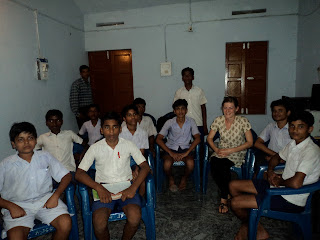A DE Core Group Meeting was held in New Delhi, from the 18th - 21st Of October 2011. All the State Program Managers and selected Regional Coordinators attended the meeting apart from the Director DE Program. Country Director, AIFT and the Accounts Team were the special attendees while Prof. Dr. Rajaram, Joint Director, CIET, NCERT attended as an external speaker. The following agenda items were taken as part of the meeting:
- Planning for DE expansion under LSP
- Extension of Full Service for 2 more years
- Pro-active approach towards Gender
- Increasing the over all DE tenure rationale
- Induction and Orientation Module for fresh team members
- Additional content for ILTM
- DE Blog
- Donor Reports
- Dell Program
- Laptops for coordinators
- Projectors for Schools (Top 25% max in first phase)
- Key Drivers for 2011
- Review of various deliverables of the team as set in Feb 2011
- DSTs for DE Program
- Discussion on Indicators
- Decreasing the number of days from 6 to 5 for DE Coordinators















